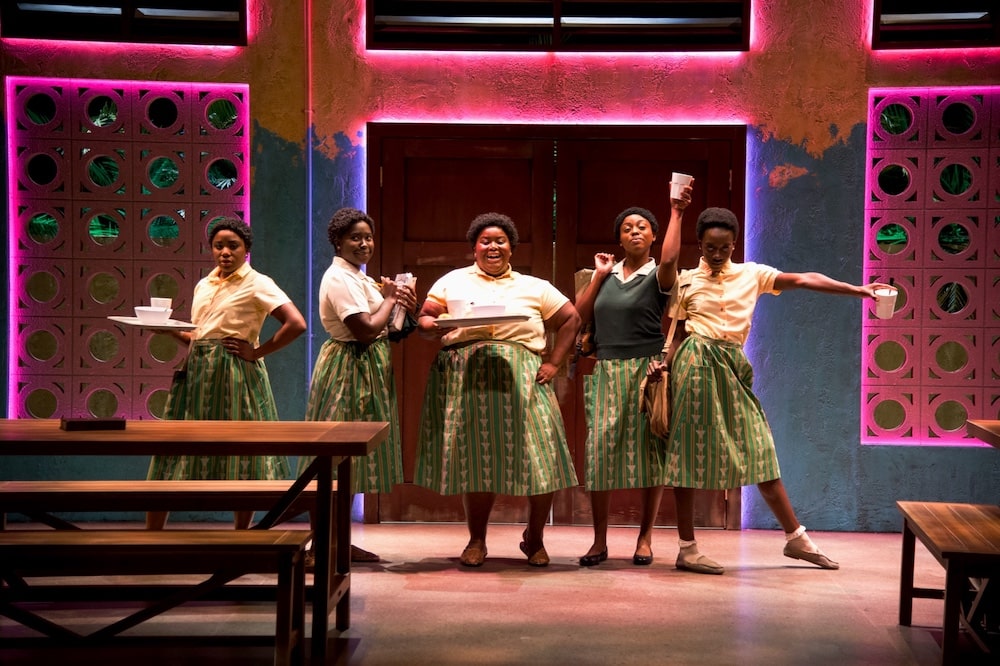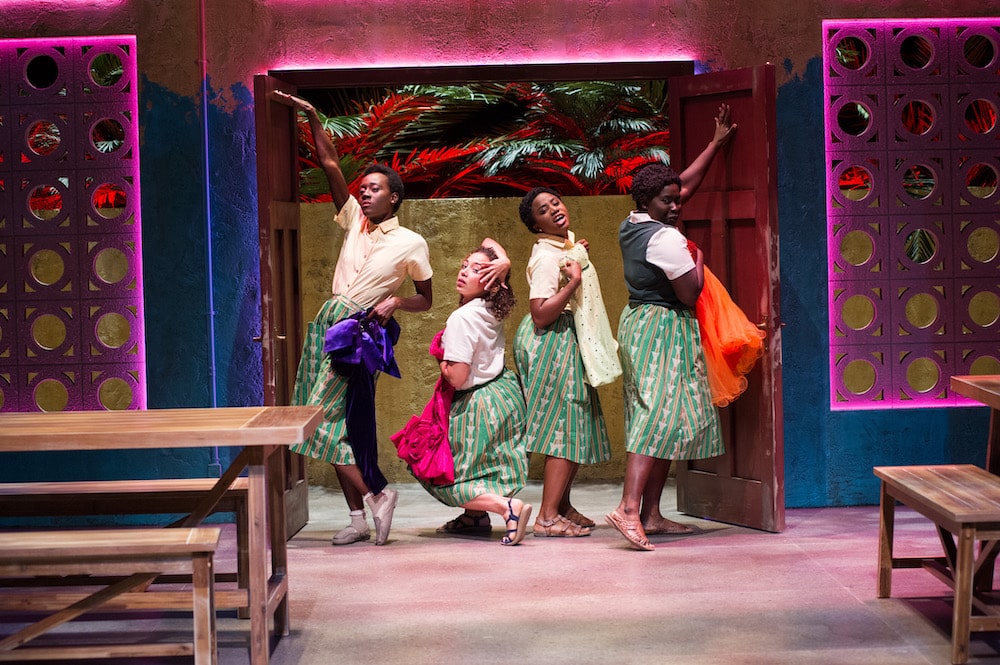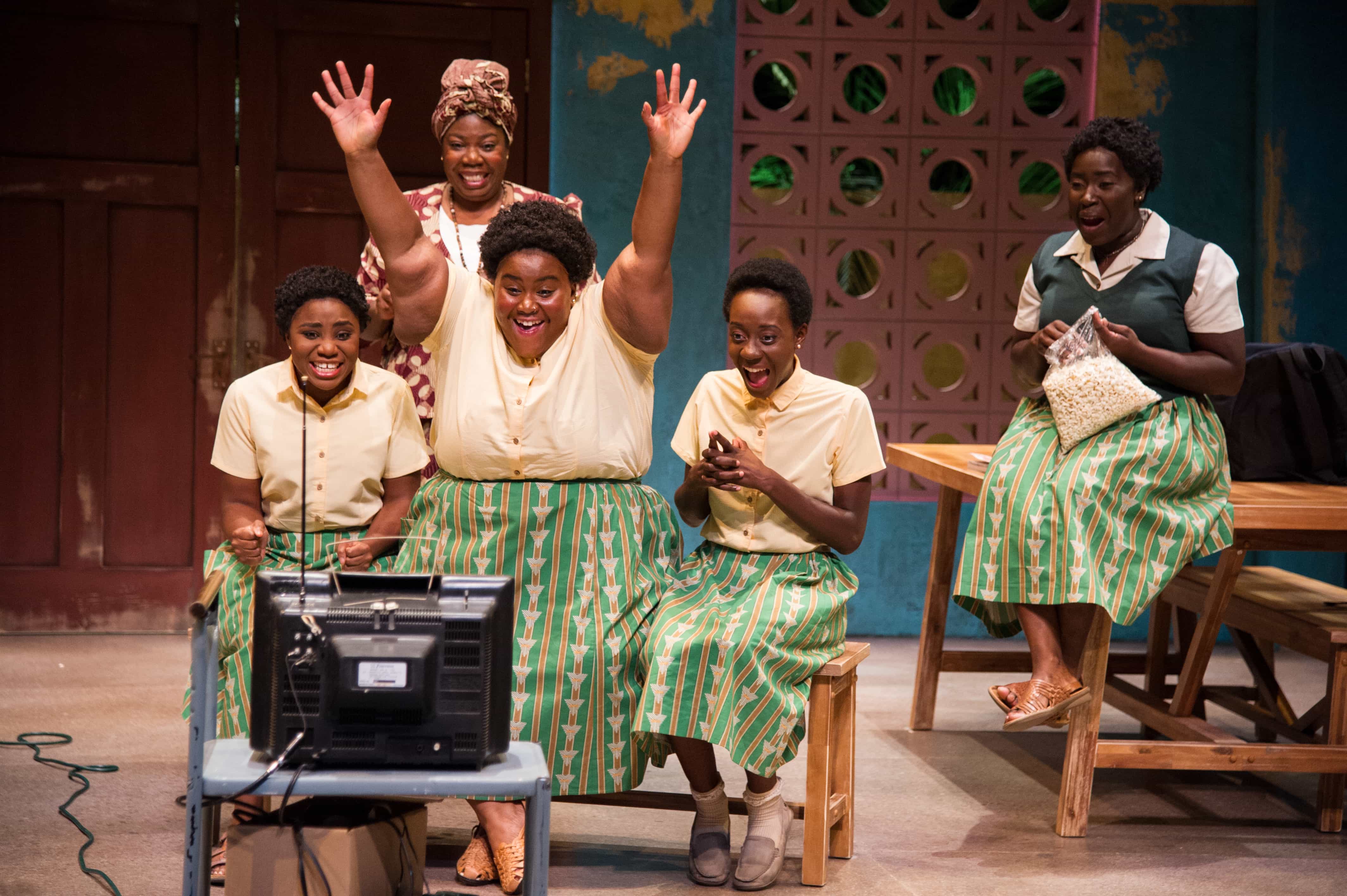Can one laugh heartily at a satirical comedy—be thoroughly engaged by the entertaining characters, story, and performances—and then after it’s over mourn what it was about? That was for me the postshow recoil from Jocelyn Bioh’s delightful School Girls; Or, The African Mean Girls Play, now playing at Round House Theatre in a vivacious production directed by Nicole A. Watson. The sadness that Bioh’s script keeps beneath the surface hit like unforeseen grief.

My colleague Ramona Harper in her fine review had given me a heads-up. School Girls, she wrote:
sashays into the world of African teen queens with a comedic briskness that’s funny and charming but also seriously sobering….
School Girls is not only comedic entertainment but also sharp criticism of a worldview that teaches women—in Africa as well as the US—to value themselves by the shade of their skin….
Skin bleaching, body shaming, and self-loathing are themes that give School Girls a deeper punch.
Further forewarning appeared in the handsome new Round House lobby, where there hangs a display—very worth a read before seeing the play—pointedly critiquing the white western beauty standards now gone global that women are expected to conform to. And a trenchant program note by Round House Dramaturg Gabrielle Hoyt attributes “racist beauty standards that create a desire for skin bleaching” to “centuries of colonial rule, [when] white officials dominated the hierarchies of nations throughout Africa, Asia, and South America.”
So conceptually I was briefed. Plus, I was familiar with white feminists’ writings about “the beauty myth” and how “beauty hurts.” So the uncomfortable-to-watch fat-shaming scene that begins Bioh’s play locked me in immediately to these Ghanian school girls’ struggle to love themselves and feel lovable in a world that never stops judging their worth by their looks.

But why, I wondered, given all this preparation, did an enormous sorrow sneak up on me after?
And then I remembered.
In the early 1980s I worked for five years at Essence as managing editor. Then as now, the magazine focused on Black women’s hair, beauty, and fashion, but back then there was an openness to more literary and substantive writing by, among others, Audre Lorde and James Baldwin (both of whose work I was fortunate to acquire and see through to publication). One day I reached out to Alice Walker, whose The Color Purple had just been published, to ask if she had anything she would like to see in Essence. Yes, she did, as it happened. Please send it, I said.
It was an amazing read, a literary essay about colorism, which she defined as “prejudicial or preferential treatment of same-race people based solely on their color.” It was full of vivid references to fiction by Black authors, and bold assertions about the extent and nature of colorism and other forms of gendered and raced oppression. Edited for length, the essay was published in the June 1982 issue of Essence as “If the Present Looks Like the Past, What Does the Future Look Like?” (later reprinted in full in In Search of Our Mothers’ Gardens). I did not know at the time that some later scholars would consider that essay the first explicit coinage of the word colorism.
But I’m getting ahead of the story—as memory often does.

What School Girls brought back to mind was what happened when the manuscript of that essay by Walker was circulated for comment among the other editors—all smart, strong Black women committed to empowering other Black women. I did not anticipate how much pain and anger the piece would provoke among them. Some even argued against publishing it at all.
Susan L. Taylor, the inspired and inspiring editor-in-chief, brokered a compromise. Essence would assign a dark-skinned Black woman to write a personal essay, and a light-skinned Black woman to write one as well. These two essays would be published on either side of Walker’s, to balance its painful topic emotionally, under the overall title “Embracing the Dark and the Light.”
I learned then about a depth of hurt that would never be mine and that I could never have imagined and that I knew, in sadness, I must never forget.
I cannot say what memories and emotions will arise when you see School Girls. But see it you should. It opens eyes and hearts and may even help heal—as laughter often does.
Running Time: Approximately 85 minutes
School Girls; Or, The African Mean Girls Play presented by Round House Theatre, plays through October 20, 2019, 4545 East-West Highway, Bethesda, MD. For tickets, call (240) 644-1100 or go online.




